


























Diaspora investment, government commitment and legacy-building: NDDIS 2025 making sure the focus is not just on business, but on the futures of Nigerians. By Estelle Uba
THE 12th edition of the Nigerian Diaspora Direct Investment Summit (NDDIS) once again demonstrated that Nigerians abroad are doing far more than sending money home – they are building the future.
Held at the Copthorne Tara Hotel in London, the summit brought together an array of government officials, business leaders, finance professionals and enterprising members of the Nigerian diaspora, all with a shared mission of strengthening Nigeria’s economy.
With the theme “Mobilising the Nigerian and African Diaspora to Support MSMEs and Job Creation for Sustainable Development”, the summit underscored the critical role the diaspora plays in advancing economic growth, fostering innovation and creating job opportunities in Nigeria.
Putting the spotlight on MSMEs: the backbone of Nigeria’s economy
Prince Bimbo Roberts Folayan, the founder of NDDIS, set the tone for the summit with an impassioned welcome address.
“We’re not financial experts,”
he said. “What we do is create a marketplace where people can come together and discuss business. You can bring your micro business and talk to others, transforming it into a small business. And if small businesses come together, who knows? We could produce a big company.”
Micro, Small and Medium Enterprises (MSME) dominate Nigeria’s business landscape, accounting for 86 per cent of employment and contributing 50 per cent of the country’s GDP. However, with an estimated $32.2bn (£24.8bn) credit gap, according to an IFC report, access to finance remains a major hurdle. The event spotlighted funding opportunities to empower young and small-scale Nigerian entrepreneurs, with banks and financial institutions pledging to support diaspora-led initiatives. The summit didn’t stop at dialogue. True to its reputation, NDDIS moved beyond discussions with its ‘deal rooms’ – private spaces where entrepreneurs, investors and government representatives could strike highvalue business deals on the spot. As Charles Ajayi-Khiran, the facilitator of the summit, put it, “We are not all talk. We are about action.”
“You can bring your micro business and talk to others, transforming it into a small business. And if small businesses come together, who knows? We could produce a big company”
While Nigeria’s diaspora has contributed over $90bn (£69.5bn) in remittances over the past five years, Abike Dabiri-Erewa, Chairperson of the Nigerians in Diaspora Commission (NIDCOM), urged the diaspora to do more by sharing knowledge, skills and resources.
“Remittances are great, but we need to go beyond that,” she said passionately. “No matter what, nobody can ignore the Nigerian diaspora. Not anymore. India, China, Pakistan – they don’t talk about their development without the diaspora; Nigeria should not be left behind. We need to see ourselves as one big family living in different rooms. My brothers and sisters, let’s work together to take Nigeria to where it belongs: the top of the mountain.”
Matching governments’ words with action: partnerships, skills training and ecotourism


PASSIONATE:
Prince Bimbo Roberts
Folayan, founder of the Nigerian Diaspora Direct Investment Summit
- Prince Bimbo Roberts Folayan, the founder of NDDIS
A highlight of the summit was the signing of a Memorandum of Understanding (MoU) between the Bauchi State Government and NDDIS, designating NDDIS as its Project/Resource Mobilisation Partner. Bauchi State showcased
six strategic interventions in education, healthcare and economic growth, while the Katsina State delegation also expressed interest in formalising a similar partnership with NDDIS. Representing Senator Bala Mohammed, the Executive Governor of Bauchi State, Aminu Hammayo, Secretary to the Bauchi State Government, delivered a presentation which celebrated Bauchi State’s reputation as the “Pearl of Tourism”.
He invited the diaspora to invest in Bauchi’s flourishing tourism sector, providing examples of
natural attractions such as Yankari Game Reserve and Sumu Wildlife Park, which cement the state’s position as a popular destination for eco-tourism.
The Nigerian government also demonstrated a commitment to job creation, with Temitola Adekunle-Johnson, MFR, Special Adviser to President Bola Ahmed Tinubu on Job Creation and MSMEs, emphasising the importance of collaboration between federal and state governments.
Alongside the President of Nigeria, it is also the responsibility
Attendees at the 12th Nigerian Diaspora Direct Investment Summit in London. The event showcased Nigerians abroad as nation-builders, uniting leaders to drive economic growth beyond remittance
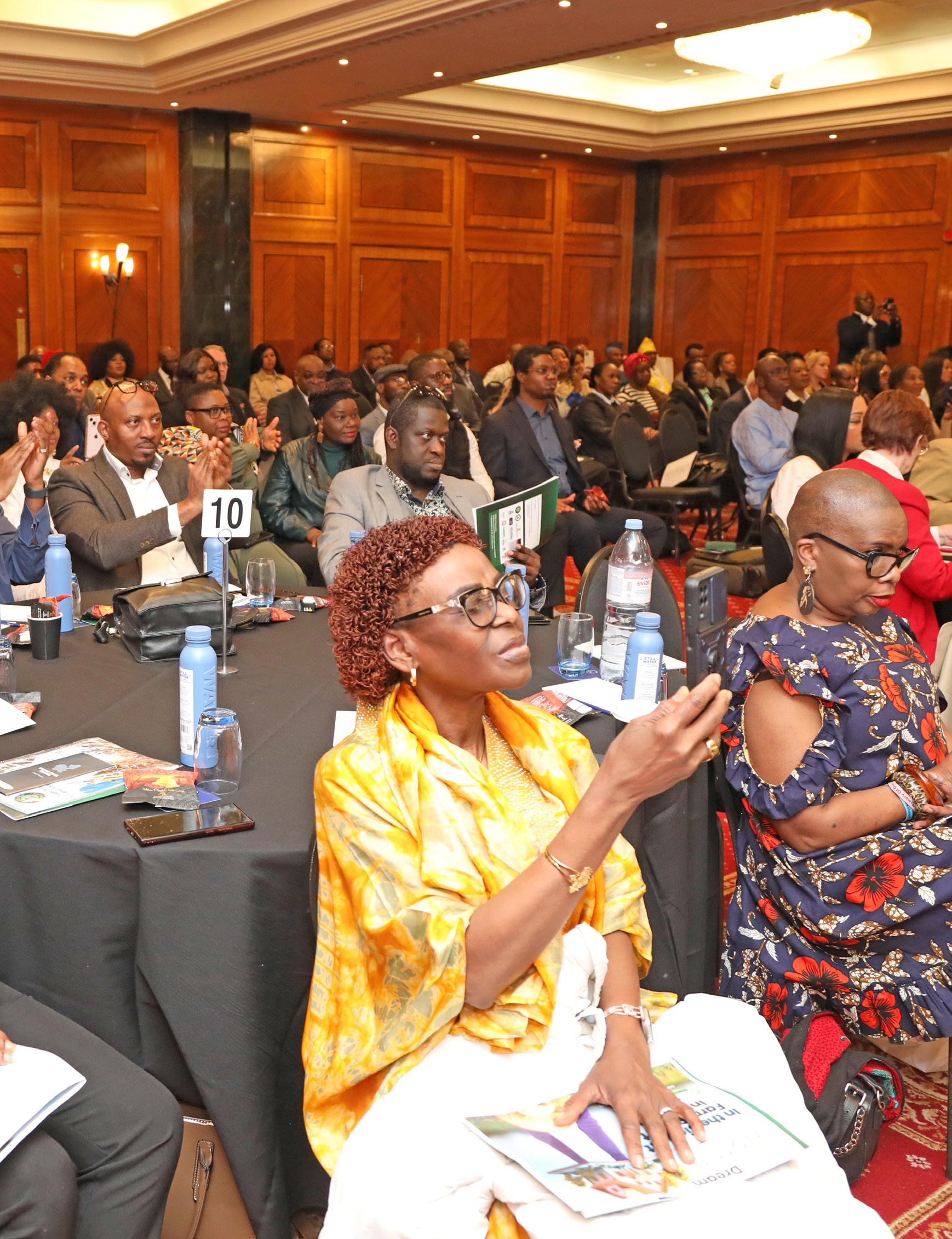
of governors to create jobs since businesses are domiciled in their states, he said. He added: “Through our National MSME Clinic, we reach out to the different governors to say ‘Excellencies, we, as the federal government, can provide XYZ. Can you meet us halfway?’ And with that, we’ve been able to launch 13 industrial hubs.
None of these hubs were funded from the federal government’s coffers; instead, from strategic partnerships. The only way to grow any economy is through partnerships.
Adekunle-Johnson went a step further, extending an invitation to NDDIS to “bring the summit to Abuja.” He pledged support in securing sponsorship and facilitating even more impactful deal room sessions in Nigeria, ensuring that small businesses reap the benefits.
Dr Afiz Oluwatoyin Ogun, Director-General of the Industrial Training Fund (ITF), announced that the government agency had just completed the training of some 29,000 artisans, and was poised to scale up the programme to train 100,000 more to
international standards. Dr Ogun detailed three exit strategies for ITF trainees: job placement, ‘talent export’ and business incubation. The first involves collaborating with the Manufacturers Association of Nigeria to match trained artisans with 9-5 jobs, while the second requires partnering with other countries to identify skill gaps abroad, training artisans to meet those needs, and facilitating their placement overseas. The final strategy, he said, “is where the diaspora comes in”.
LEADER: Councillor Sunny Lambe, who is also Deputy Mayor of Southwark, urged diaspora investment in his borough, which includes Peckham, a district dubbed ‘Little Lagos’ because of its vibrant Nigerian community
Urging the diaspora to channel their resources into ventures that will yield lasting benefits, he remarked: “Many of us send our money home for birthdays and Christmas – things that won’t benefit us. If Nigeria is better, we would all go home. It is time we start investing (in these artisans). ITF will monitor these MSMEs, and your money will not go down the drain. Ladies and gentlemen, come home. Nigeria is sweet.”
Echoing the importance of diaspora investment, Councillor


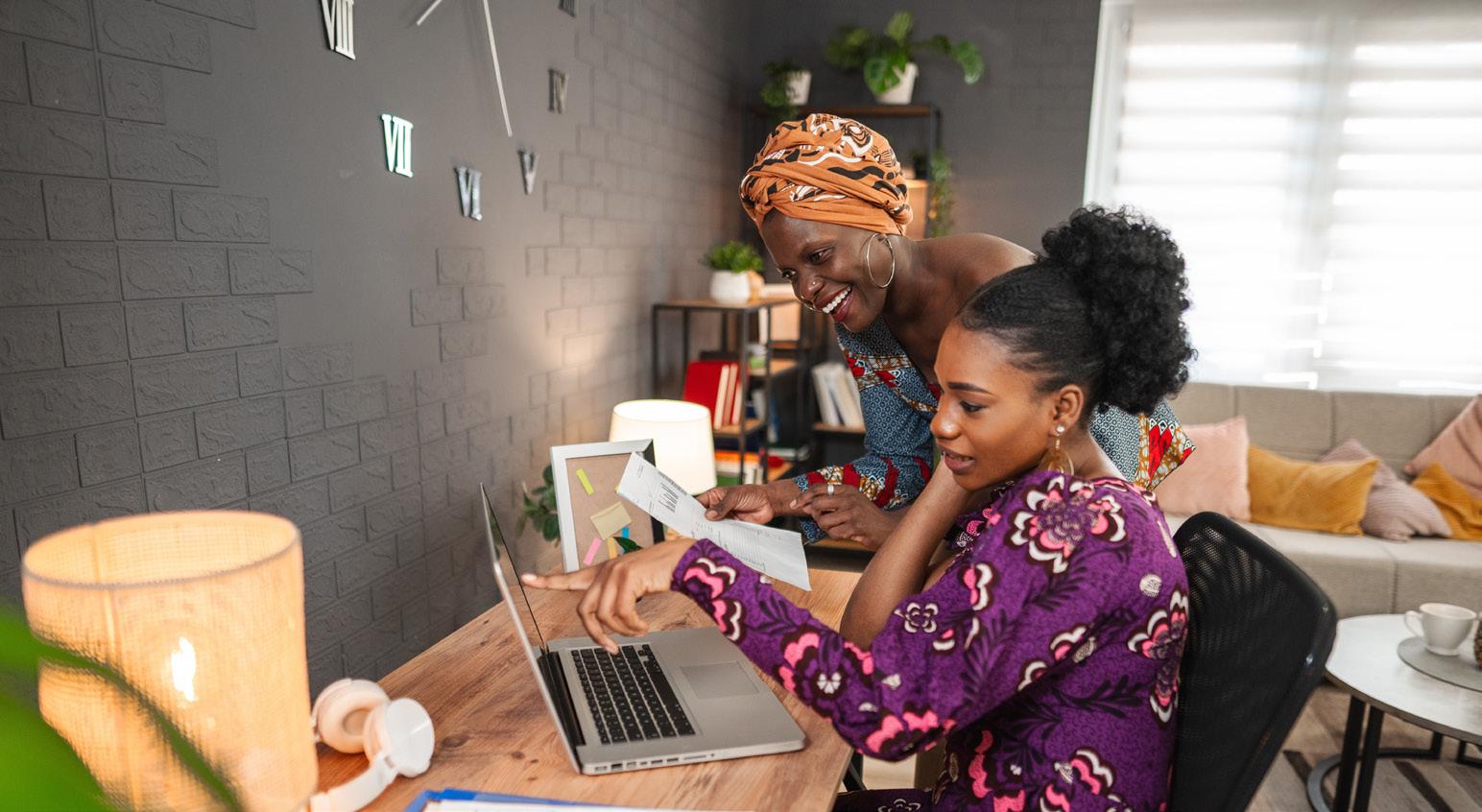
Sunny Lambe, Deputy Mayor of Southwark Council (which serves Peckham, a district dubbed ‘Little Lagos’ because of its vibrant Nigerian community) said: “Southwark is always open for business, and there’s actually one important business opportunity that is coming up: Did you know that the Bakerloo Line extension is now live again? We need people around here, around the world, to come and invest in all the opportunities that Old Kent Road is going to bring. Very soon you’ll be begging us to have a place there, so I encourage everyone to please come and invest in Southwark in the UK.”
Looking ahead: Securing a legacy for the youth and sustaining momentum for the future
A standout presentation came from Dr Moji Davids, Group Managing Director of Xtralarge Farms & Resorts, who introduced the audience to the untapped potential of agro-tourism. Her company, which operates 14 farm locations across Nigeria, Benin, and Cameroon and employs
around 1,000 people, aims to host one million tourists annually at its farm resort in Ogun State.
“We are bringing entertainment, fun and excitement to the farm to change people’s perception of agriculture,” Davids explained.
She added: “Since I was a child, I’ve always heard the expression ‘Children are the leaders of tomorrow’. If agriculture is going to be the business of tomorrow for Africa, and these children are not being exposed to it, then it is going to be a problem.”
Perhaps one of the most stirring messages of the day came from 20-year-old Immanuela ChijokeOgwurike, medical neuroscience student and TEDx Speaker.
Lending a voice to the youth of Nigeria – the country with the largest youth population in the world and a median age of 18.1 years – Chijoke-Ogwurike’s words resonated deeply:
“Creating jobs and impacting the economy for the betterment of our nation is also about legacy — the idea of building something today that is handed down to the next
generation tomorrow. Leadership goes beyond ‘I.’ When you invest in people, you make a statement that their dreams matter, and that no dream is too big.”
This message perfectly encapsulated the heart of NDDIS 2025: investing not just in businesses, but in the lives and futures of Nigerians.
The summit ended on a high note, with commitments from stakeholders to continue driving diaspora engagement, MSME financing, and mentorship programmes. The execution of the MoU with Bauchi State, the finalisation of a similar agreement with Katsina State, and the establishment of more deal room sessions in Nigeria are all on the horizon for NDDIS.
As Temitola Adekunle-Johnson reaffirmed, “Small businesses must survive. We can’t have a nation without them.”
With NDDIS remaining steadfast in its mission to bridge the gap between the diaspora, the government in Nigeria and the UK, and the private sector, the future of Nigeria’s MSMEs is indeed brighter.
THE House of Lords provided the stage for a landmark gathering of leaders, policymakers and cultural innovators from the UK and Nigeria’s creative industries.
Hosted by Lord Stephens and organised by Eryca Freemantle, the founder of EATOW (Embracing All Tones of Women), the event, An Audience with The Honourable Obi Asika, delivered an intimate and impactful keynote on fostering equitable partnerships and celebrating the global influence of Nigerian creativity.
EATOW also launched the upcoming trade mission from the UK to Lagos and Abuja from June 4-10, 2025 to empower professionals seeking to develop partnership and drive innovation within the creative and beauty industries.
The day’s discussions at the House of Lords transitioned into an inspiring evening celebration at the Africa Centre, further solidifying the bonds of collaboration and innovation between the two nations.
The day was hosted by Yemisi Mokuolu, founder and CEO of Hatch Ideas Worldwide Ltd and Hatch Africa, and co-hosted by Bolaji Olatoye, CEO of Altitude AI Consulting.
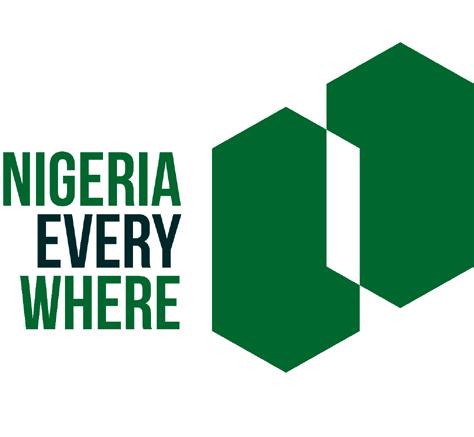
The session at the House of Lords was followed by a keynote welcome from Lucy Haine, Global Digital Commerce & Marketplace Lead of the UK Department of Business & Trade, who formally announced Nigeria as a trading partner to the UK. Freemantle highlighted the mission of her organisation to build bridges through culture, creativity and collaboration. She emphasised the importance of empowering creative professionals and fostering partnerships that drive global change.
“This gathering is a testament to
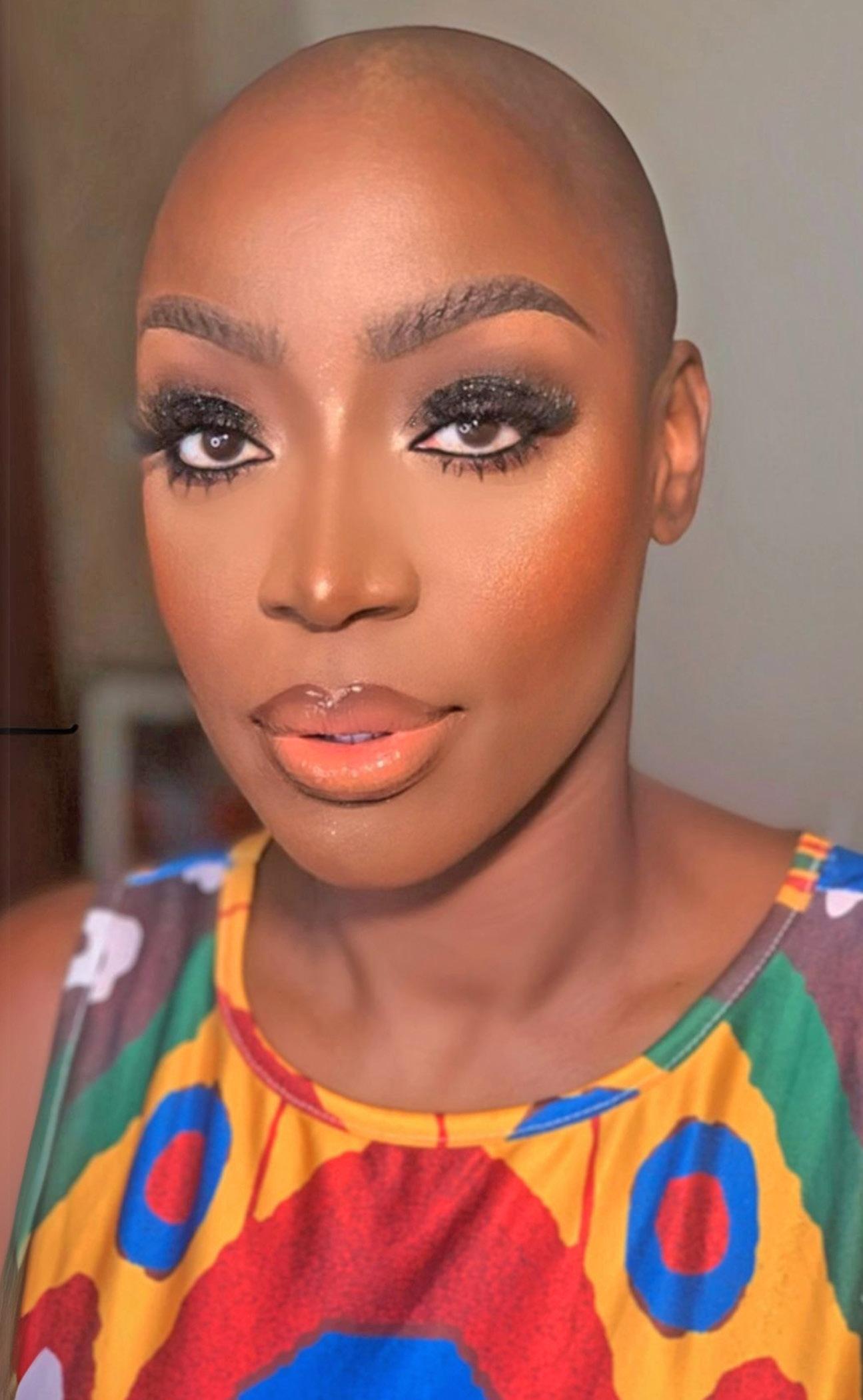
MAKING IT

the dynamic spirit of Nigeria’s creative industries and the opportunities that arise when we collaborate across borders. Together, we can inspire innovation and create a future defined by equity and empowerment,” said Freemantle.
Keynote address: “Nigeria everywhere”
The Honourable Obi Asika, Director-General of the National Council for Arts and Culture (NCAC) and Co-Chair of the UK-Nigeria Technical Working Group, delivered a powerful keynote address titled Nigeria Everywhere and fireside chat with Yemisi Mokuolu.
He outlined initiatives such as the Creative Leap Accelerator Programme (CLAP) and the Creative Economy Development Fund (CEDF), which aim to transform talent into opportunity and provide structured financing for creatives. Asika also called for practical partnerships with UK institutions to co-create platforms, co-productions and infrastructure that further strengthen the creative ecosystem.
“Nigeria’s creative industries are not just culturally dominant; they are economically impactful. From Afrobeats to Nollywood, our talent is shaping global narratives and, with strategic partnerships, we can expand these opportunities even further,” said the Honourable Obi Asika.
Discussions: building bridges across borders
The event featured two dynamic panel discussions:
1. UK & Nigeria Collaboration, moderated by Yemisi Mokuolu, explored strategies for fostering cultural and economic ties. Panellists included Ed Emeka Keazor, DJ Abass, Femi Oyeniran and Hannah O’Leary.
2. The Business of Media, Culture & Entertainment, led by Bukky George Taylor, delved into the evolving dynamics of the
“Strong partnerships thrive on mutual respect and shared vision. Together, we can create a future where creativity knows no borders”
- Eryca Freemantle
industries. Panellists included Adesope Olajide, Chioma Ude, Chidi Okeke, Natasha Manley and Nike Awoyinka.
Both panels underscored the importance of shared values, mutual respect, and a commitment to equitable partnerships in driving sustainable growth.
A call to action: equitable partnership and proudly Nigerian
The event was closed by Oba Nsugbe, Chair of the Africa Centre. He highlighted that the overarching theme of the day was a call for equitable partnerships that empower producers and creatives and foster inclusive growth. Attendees were encouraged to embrace the ethos of being Proudly Nigerian while
INFLUENTIAL:
The Honourable Obi Asika is the Director-General, National Council for Arts and Culture,

building bridges that benefit both nations.
Evening celebration at the Africa Centre
The evening concluded with a vibrant reception at the Africa Centre, where dignitaries, creators and policymakers continued the day’s conversations in a relaxed and celebratory atmosphere.
About EATOW
EATOW (Embracing All Tones of Women) is a global organisation dedicated to building bridges through culture, creativity and collaboration. Its mission is to empower creative professionals, drive innovation and foster crosscultural partnerships that inspire global change.
Ojude Oba 2024: a showcase of fashion and prosperity in Yoruba tradition.
By Emmanuel Solate
THE OJUDE OBA is celebrated in the southwestern part of Nigeria by the Ijebu people.
The people of Ijebu are a subethnic Yoruba group in the southwestern part of Nigeria. The Ijebus in present-day Ogun state share boundaries with Ibadan, Oyo state, the Egbas in Abeokuta and the Ilajes, very close to Lagos. They are closest to the lagoon waters of Epe, Ejinrin, Ikorodu, and Ogun Waterside. Ijebu is divided into Ijebu Ode, Ijebu Igbo, Ijebu Imushin, Ijebu Ife and Ijebu Ososa. Ijebu is a combination of two words, Ije and Ibu, which means “feed of the deep” of the ocean.
The Ojude Oba Festival is one of the significant cultural and religious events celebrated annually in Ijebu Ode, Ogun State, Nigeria. This vibrant festival, which takes place three days after Eid-el-Kabir, gathers the Ijebu people to honour
the Awujale (the paramount ruler of Ijebuland) and to celebrate their rich heritage and traditions.
History of the Ojude Oba celebration
The Ojude Oba Festival dates back over a century to the reign of Oba Adesumbo Tunwase, the Awujale of Ijebuland in the late 19th century. Initially a religious celebration by early Muslim converts in Ijebuland to thank the Awujale for his support and to seek his blessings after the Eid-El-Kabir (Ileya) festival, it has since evolved into a major cultural event that includes people of all faiths.
The festival has also been linked to Chief Balogun Kuku over a century ago. In 1896, 41 Ijebu men were baptised by Reverends R. A. Conner and E. W. George, to advocate monogamy. This prompted Chief Balogun Kuku’s conversion to Islam, forsaking Christianity due

to its restriction on polygamy. His influential conversion significantly boosted Islam’s followership.
Ojude Oba Festival 2024
The Ojude Oba Festival is renowned for its colourful processions. The event features various age-grade groups known as “regberegbes”, dressed in elaborate attire. Each group parades through

the streets to the Awujale’s palace, showcasing their unique dances, music, and performances. The regberegbes are known to compete amongst themselves to put on an impressive display, showing their strength, wealth, and fashion sense. Egbe Bobasete Okunrin Omooba turned out as the bestdressed age grade. Egbe Bobagunte Okunrin Akile Ijebu and Egbe
Bobamayegun Okunrin Asiwaju emerged as first and second runners-up in the male category. In the female category, Egbe Bobagunwa Obinrin Omooba came first.
Another highlight of the festival was the parade of horse riders, often descendants of noble families, who display their horsemanship skills adorned in splendid Yoruba traditional regalia.

Julius Popoola is a distinguished figure in software engineering. He began his journey at Brunel University, graduating in 1998 with a bachelor’s degree in Electrical Engineering, then furthering his studies at Concordia University in Montreal.
Over his illustrious career, he has contributed to leading organisations such as Slalom, BCG, Sky, BP, Mobihealth, Vision RT, and Future Electronics. With proficiency in Java, Python, and C#—among others—alongside extensive experience in GenAI, cloud computing, database management, and continuous integration, Popoola has consistently delivered innovative solutions across multiple industries.

Beyond professional work, he has authored influential research, including “Performance Evaluation For Tracking Algorithms Using Object Labels” at ICASSP 2008 and “Ayo, the Awari Player” at CEC2004. These publications reflect his commitment to advancing the field of software development, demonstrating both academic rigour and practical expertise.
Popoola’s impact extends beyond the corporate sphere, thanks to his dedication to mentoring aspiring technologists—particularly within African and Caribbean communities. In 2024, he addressed more

is a versatile filmmaker, writer, cultural curator, documentarian, and music executive dedicated to showcasing Africa’s rich artistic heritage on a global scale.
As the CEO of Showlate Entertainment Limited, he has been at the forefront of promoting African storytelling through film, music, and cultural festivals.
Over the next five pages Emmanuel celebrates some of Nigeria’s most iconic festivals.

than 1,000 youths at the University of Ibadan, emphasising fundamental software engineering concepts.
He has also delivered several presentations illustrating how digital skills can unlock significant economic opportunities and how software can revolutionise the energy sector through monetisation and efficient management strategies.
His consistent dedication has garnered recognition from organisations such as the Nigerian British Business Forum, which honoured him with a Merit Award in 2024. Additionally, he has provided technical consultations to several community-focused entities, including BYP Network, Niyo Hair and Beauty, RCCG Praise Tabernacle, and WeAfric, reflecting his passion for socio-economic progress.
In all his endeavours, Popoola exemplifies the ideal blend of technical prowess, academic rigour, and community engagement.
His story, spanning three continents and multiple industries, continues to inspire those keen on harnessing technology for both professional success and the betterment of society. He remains committed to empowering others through knowledge-sharing and ongoing visionary leadership.
Osun-Osogbo Festival: a timeless celebration of Yoruba heritage.
By Emmanuel Solate
THE Osun-Osogbo Festival
is an annual cultural and religious event in Osogbo, Osun State, Nigeria, held every August to honour Osun, the Yoruba goddess of fertility, love, beauty, and water.
For over 600 years, it has served as a link between the Yoruba people and their heritage, making it one of the most significant and enduring festivals in Yorubaland.
Recognised by UNESCO in 2005, it stands alongside other Yoruba cultural heritage elements like the Ifa Divination System, Gelede Festival, and the recently inscribed Sango Festival.
Historical origins
The festival’s origins are deeply connected to the founding of Osogbo in the 15th century. According to legend, early settlers led by Olutimehin encroached on Osun’s sacred grove while clearing land for
their settlement. The Osun goddess appeared to them, warning against desecration. In exchange for allowing them to stay, she made a covenant: they were to honour her annually with sacrifices and rituals, and she would bless and protect them. This agreement has been upheld for centuries, forming the foundation of the Osun-Osogbo Festival.
Rituals and activities
The festival unfolds over two weeks, beginning with “Iwopopo”, a traditional town-cleansing ritual to rid Osogbo of evil influences. This is followed by the lighting of “Ina Olojumerindinlogun,” a sacred 500-year-old 16-point lamp symbolising continuity and tradition.
A major highlight is the Ataoja of Osogbo’s visit to the Osun Grove, where he offers prayers and sacrifices. The Ataoja, both a political and spiritual leader, reaffirms
THE AFRICA CENTRE proudly marks its 60th anniversary, celebrating six decades as a vibrant hub for African heritage, culture, and dialogue in the UK.
Established in 1964, The Africa Centre has been instrumental in fostering connections between Africa and its global diaspora, serving as a platform for artistic expression, thought leadership, and social change.
The milestone will be com-
memorated through a series of events and initiatives that highlight the Centre’s legacy while setting the stage for its future. These celebrations will feature cultural performances, exhibitions, panel discussions, and community engagements designed to honour the rich history and evolution of African culture in the UK and beyond.
A Legacy of Influence and Inspiration Since its


the community’s commitment to Osun, seeking her continued blessings.
The festival culminates in a grand procession from the Ataoja’s palace to the Osun-Osogbo Sacred Grove, a UNESCO World Heritage
Site. Thousands of participants, dressed in colourful traditional attire, partake in drumming, dancing, and singing as they accompany the “Arugba,” (which translates as the calabash carrier), a young virgin maiden appointed
by the Ifa oracle to carry a sacred calabash filled with offerings for Osun. The Arugba’s role is highly symbolic – she serves as a spiritual vessel, believed to carry the prayers and hopes of the people.
Upon reaching the Osun Shrine,
ENDURING: The OsunOsogbo Festival culminates in a grand procession to the Osun-Osogbo Sacred Grove
final rituals are performed by the Ataoja and priests, invoking Osun’s blessings for prosperity, fertility, and protection.
Cultural and spiritual significance
Beyond its religious aspects, the Osun-Osogbo Festival is a vibrant expression of Yoruba identity and tradition. It attracts thousands of devotees, tourists, and dignitaries, reinforcing the cultural importance of Osogbo as a spiritual hub.
The festival’s recognition by UNESCO further highlights its global significance as a heritage site worth preserving.
As a living tradition, the Osun-Osogbo Festival continues to thrive, showcasing the resilience of Yoruba culture and the deep-seated reverence for Osun, the divine protector of Osogbo.

Kano Durbar Festival: a majestic celebration of culture and heritage. By
Emmanuel Solate
THE Durbar Festival in Kano has always been celebrated annually for over 200 years. In precolonial times, it was initially a military parade, organised by the Emir to display the readiness of the troops and to celebrate religious and significant political events.
The Durbar began in the 1900s after the city of Kano was included in the colonial government of the British empire after the Battle of Kano. The first significant Durbar in Nigeria was held on January 1, 1900, marking the transition of the Royal Niger Company to an Imperial Protectorate. The Kano Durbar festival was used as a public display of Kano’s traditional history and culture to welcome Emirs, governors, colonial district heads, and notable guests such as the Prince of Wales who visited Kano in 1925 and Queen Elizabeth

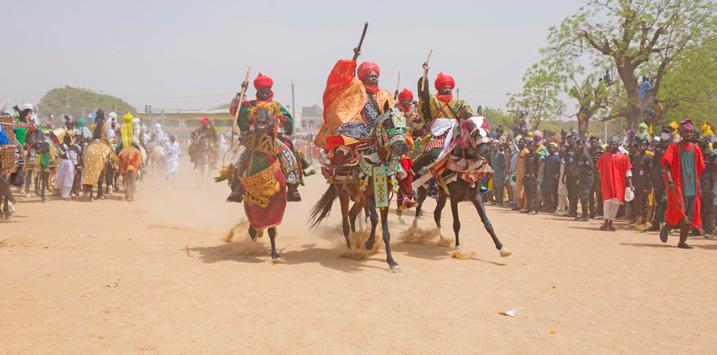
II in 1956 before Nigeria gained her independence in 1960.
The Kano Durbar festivities
The Kano Durbar or Hawan Sarki (Riding of the King), is an annual cultural, horse-riding festival synonymous with the Muslim holidays of Eid al-Adha and Eid al-Fitr, marking the conclusion of Ramadan. This festival is celebrated in many northern Nigerian cities; however, the Kano Durbar is the
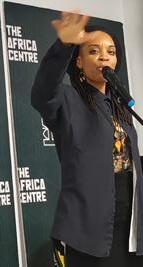
founding, The Africa Centre has played a crucial role in shaping discourse on African identity and representation.
Over the decades, it has welcomed esteemed thinkers, activists, and artists, from Nobel laureates to emerging voices redefining the continent’s narrative. The Centre has been a key gathering place for pioneers in the arts, politics, and academia, strengthening the bonds between Africa and the world.
Looking to the Future As it enters its seventh decade, The Africa Centre remains committed to innovation and inclusivity, evolving to meet the needs of new generations. The Centre continues to champion African excellence
most prominent. Each day of the festival holds significant importance, scheduled as follows:
The first day (Hawan Sallah)
The Emir and his entourage ride to the Eid prayer ground and then through different quarters of the city, meeting the State Governor and delivering a Sallah message. Each group is led by the district head (Hakimai) or a titled nobleman from the emir’s court (Masa-
(left) Artist Stella B performing at The Africa Centre
through its dynamic programming, fostering cross-cultural dialogue and empowering diverse communities.
“The Africa Centre enters this year celebrating our 60th anniversary with a profound sense of pride, gratitude, and excitement. This anniversary is not just a reflection on our past achievements but a moment to envision the future,” said Olu Alake, CEO of The Africa Centre. “We are excited to build on our legacy, amplifying African voices and perspectives.
As part of its celebrations, the charity is inviting its diverse communities to share any memories they have of their time at the Centre.
The collection will be part of a living archive that will be one of the key legacies of this milestone year.

rauta). During the Durbar, the Emir makes a stunning appearance, clad in a variety of hues and decorated with regal regalia.
The second day (Hawan Daushe/The Oldest Ride)
The Emir visits the Palace of the Queen Mother and several city quarters, culminating in a cavalry salute (Jahi) to the Emir at the palace (Gidan Rumfa). It features a series of historic family quarters
and a return to the palace through the Kofar Kudu gate for the Jahi, where horsemen gallop across the esplanade of the Great Mosque with swords drawn, passing the Emir and stopping to salute him.
The third day (Hawan Nassarawa/Victory Parade)
The Emir pays a visit to the Nassarawa Palace, prays at his ancestors’ tombs, and pays homage to Kano State officials.
SPECTACULAR:
The Kano Durbar is an annual cultural, horse riding festival synonymous with the Muslim holidays
The fourth day (Hawan Dorayi)
The Emir tours the Dorayi Palace outside the city, before returning to the city in a grand procession with the horsemen to the Gidan Rumfa, accepting greetings along the way. The Durbar concludes at Kofar Kwaru as the titleholders give the Emir one final salute before he leaves for the palace. This day starts before 8 am, and involves a choice between visiting the Dorayi or Fanisau palace.
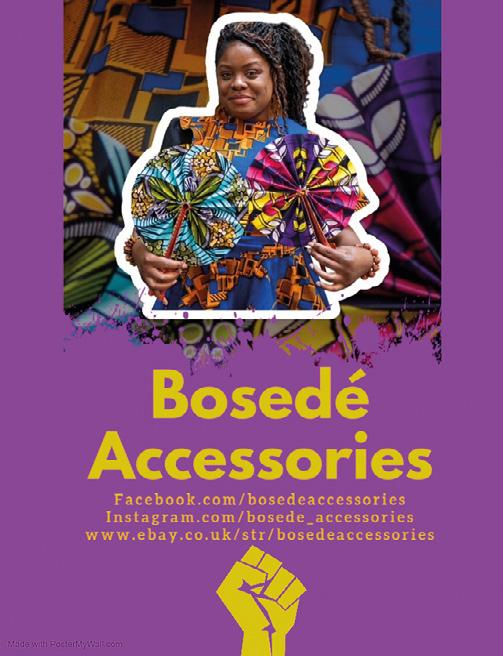
Okazi Emii Festival: celebrating unity, tradition, and the Ndi Igbo culture.
By Emmanuel Solate
ACCORDING TO traditional sources, the Okazi Emii Festival has ancient origins that date back to the time of Adam. This festival is revered as one of the most significant festivals in Igbo land, symbolising honour for the Igbo people worldwide. It is celebrated on December 31, and festivities usually extend into January.
Emii is one of the ten villages that makes up the Owerri North Local Government Area in the south-eastern region of Nigeria. It was once an autonomous community located in Imo State, close to the city of Owerri.
Originally comprised of ten villages, the ancient Emii town underwent a division into three distinctive communities – Mbaoma, Ezimba, and Emii Central Community. Mbaoma autonomous community encompasses Ubaa
(alternatively spelled as Ubah), Umuawuka, and Emohe. The inhabitants of the ancient Emii, now dispersed across these three autonomous communities, identify as Igbo speakers of the Owerri dialect and proudly refer to themselves as “ndi Owere” (Owerri people).
Annually, the Okazi Emii Festival marks the culmination of the year, showcasing the rich cultural heritage of the Emii people.
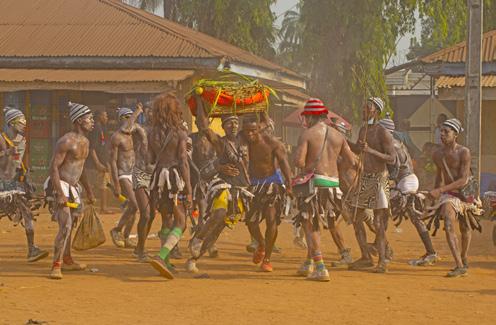
ROOTED IN TRADITION:
Festival and the New Yam Festival
Additionally, Okazi Emi Festival is not to be confused with the Ite Okazi Festival, which is an annual celebration of the new yam harvest. Held in August, it features traditional dances, music, and feasting. Both festivals share a common element — the use of Okazi leaves, a key ingredient in Igbo cuisine.





The Emii Festival takes place on the last Afor day of the year in December, a period marked by peaceful coexistence and favourable weather. During this time, individuals are encouraged to resolve conflicts, mend long-standing family disputes, and foster an environment of love and unity. It is believed that anyone who engages in violence during this period will face consequences. Burials and burial ceremonies are prohibited to maintain an atmosphere of tranquility.






Ongoing significance and global celebration
The festival holds significance not only locally but is celebrated by Igbos worldwide. The Okazi Emii Festival is a significant cultural event in Owerri and attracts both indigenes and tourists alike as many Igbo do travel to Emii for the celebration. It stands as a cultural beacon, promoting love, peace, and resolution of differences among the Igbo people. It features processions by different masquerades and age group clans, such as the famous “Ogbuamuma” Masquerade group from Umuawuka Emii, Owerri North, Imo State and Onyirimma Masquerade, from Mbaoma Emii.
The essence of this festival is that it is celebrated to bring communities together to further settle and correct their differences. The festival serves as a unifying force, emphasising the shared connection among these communities, with Okazi leaves acting as a symbolic thread that binds them together.
The Okazi Emii Festival, deeply rooted in history and tradition, serves as a celebration of unity, cultural identity, and the wholesomeness of the Ndi Igbo culture of the Emii communities.






























Opobo Nwaotam Festival: a vibrant festival in Opobo, Rivers State. By
Emmanuel Solate
THE Nwaotam Festival in Opobo Kingdom, Rivers State, Nigeria is a colourful and culturally rich event that highlights the distinctive customs and history of the Opobo people.
The festival is rooted in the cultural heritage of the Ibani people but its influence extends to other regions where the Ibani people and their traditions have migrated. Celebrations of the Nwaotam can also be found in communities such as Bonny, Andoni, Egwanga, Aba, Lagos, and Port Harcourt.
Opobo Kingdom
Opobo Town is located in Opobo/ Nkoro Local Government Area in Rivers State, Nigeria. Opobo Kingdom is made up of 67 War Canoe Houses that are grouped into 14 sections also known as “polos”.
Origins of the Nwaotam Festival
The Nwaotam Festival in Opobo Kingdom, Nigeria, has its origins
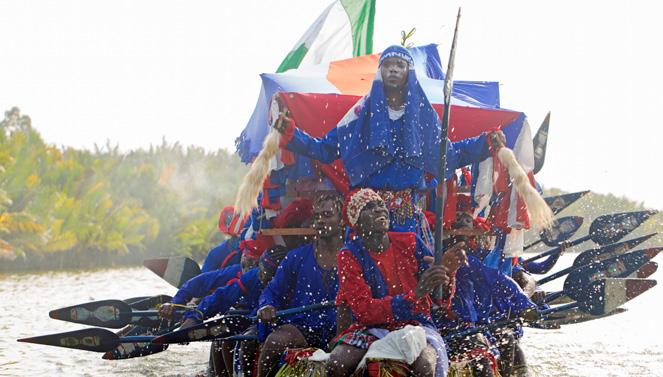
among the Ndoki people of present-day Abia State. Historical traditions suggest that the Ndoki people had long-standing interactions with the Ibani people of Bonny and Opobo.
The Nwaotam masquerade has ties with the ancient deity worshipped by the Ndoki people, known as the Ottam. This cult was deeply entrenched in the spiritual

practices of the Ottam tribe, who were known for their distinctive physical markings and rituals. During the 18th and 19th centuries, the Ottam were introduced to Bonny as part of the European slave trade, where they were described as robust individuals with notable tribal marks. The Nwaotam masquerade evolved from these ancient worship practices. Originally emerging
from a mythical grove in Mkpajekiri near Ohambele Ndoki, the Nwaotam cult developed as the local deity, representing the spirits worshipped by the Ottam. The masquerade was integrated into Opobo culture when the Opobo people, under the leadership of Captain Uranta and with the assistance of King Arthur Mac Pepple, transported the original totem —
a mummified Nwa-Ottam head — from Azumini to Imo River, and eventually to Queens Town by 1920.
Pre-Festival
Days before the festival, members of the Nwaotam masquerade groups, known as Ntuma in Queens Town and Mkpa in Opobo Town, engage in a period of
RITUALS: The Nwaotam Festival in Opobo Kingdom includes colourful boat regattas
spiritual preparation. They spend seven days in the cemetery or the forest, paying homage to the ancestors (Ndi Itchie) and fortifying themselves with spiritual power. During this time, they adhere to a strict diet, consuming only yam, corn, or plantain prepared by themselves, avoiding food prepared by women. This ritual underscores the importance of purity and respect for ancestral spirits.
The festival comprises several activities, including masquerade (Black and White garment) display, cultural performances and colourful boat regattas. Before the festival begins, tribal groups spend the night at sea, engaging in prayers and rituals to ward off evil forces. This nocturnal vigil at the seashore is a preparatory act that sets the stage for the masquerade’s entrance. The festival officially starts with a procession along the seashore, marking the beginning of the celebrations. The masquerade’s performance is structured around age groups, each contributing to the festive atmosphere with their unique traditions and rituals.
Rwanda, often referred to as the “Land of a Thousand Hills,” is a picturesque landlocked country in East Africa with diverse terrains celebrated for its stunning lakes, lush rainforests, diverse wildlife, and captivating landscapes. The capital city, Kigali, has garnered international acclaim for its cleanliness, safety, and burgeoning culinary scene, offering visitors a wide selection of bars and restaurants with scenic views, relaxed atmosphere and warm hospitality. Notably, Kigali has been recognized as one of Africa’s top must-visit cities, attracting tourists with its array of culinary offerings, vibrant culture, economic growth, and natural beauty.
Africa’s Emerging Investment Hub Rwanda has rapidly positioned itself as one of Africa’s most attractive destinations for investors, thanks to its business-friendly environment, strong governance, and strategic economic policies. The country’s commitment to innovation and impressive economic growth present numerous opportunities for both local and international investors. Key factors contributing to Rwanda’s investment appeal include World-Class Infrastructure, with a modern international airport, great roads and internet everywhere. Stable and Secure Economy with robust economic policies which create a secure environment for long-term investments.
Booming Sectors: Investors are thriving in key industries such as tourism, real estate, technology, agriculture, and renewable energy, each benefiting from government incentives and strong infrastructure support.
Activities in Rwanda offers a wide range of activities for nature enthusiasts and culture seekers alike for those seeking nature and rural experiences just a few hours from Kigali, Rwanda offers:
Coffee and Tea Farm Tours: Visitors can explore local agricultural practices and savour some of the best coffee and tea in the region.
Volcanoes Forest National Parks: Rwanda’s national parks provide incredible wildlife experiences, such as observing baboons or trekking with mountain gorillas. The rich biodiversity and stunning landscapes make these excursions a highlight for any visitor.
Nyungwe Forest National Park: Features extensive hiking trails with breathtaking views.
Cycling: With the terrains and safe roads, it’s a cyclist dream.
Water Sports: Visit the scenic Lake Kivu for kayaking, swimming, fishing or just relaxing.
Museums and Cultural Sites:
• Kigali Genocide Memorial: commemorating the victims of the 1994 genocide.
• Rwanda Art Museum and the Presidential Palace Museum for the country’s history and culture.
RwandAir operates daily to Kigali from London Heathrow. Flight only from £750pp
7 nights package from £1049pp
Includes flight & hotel. t&c applies









Ariyon Bakare –British actor, writer and director known for his roles in Mr Loverman and His Dark Materials and set to star in the upcoming Doctor Who series – has become WaterAid’s newest ambassador after returning from an inspiring trip to Lagos, Nigeria to see how clean water and decent toilets can change lives for good.
Ariyon’s enthusiasm for supporting WaterAid – an international charity working to ensure everyone everywhere has access to clean water - sparked from his own experiences in his teenage years, where he grappled with homelessness.

Ariyon said: “It was a fight for survival. I was fortunate to find a home eventually, but the lingering empathy for anyone struggling without fundamental human rights has never left me.”
In addition to this, Ariyon has a deep passion for Nigeria and Lagos - his father’s hometown and the beating heart of the Nollywood film industry. Ariyon describes Lagos as “a city like no other— vibrant and electric. From the bustling markets of Balogun to the shimmering coastline of Victoria Island, every corner of Lagos tells a story of innovation and survival.”
Yet, beneath its energy, Lagos struggles with a crisis –

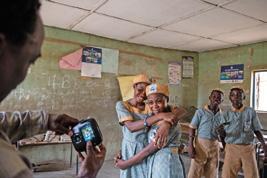
access to clean water. While being one of the fastestgrowing cities in Africa, only 36% of schools and 15% of household members have access to basic services, like clean water and safe toilets. This is having a major impact on health, education, and women and girls across the urban coastal city – something Ariyon witnessed firsthand during his trip.

Ariyon described his return to Lagos as “emotional and profoundly eye-opening”, witnessing entire communities battling with the devastating consequences of an inadequate water supply. He met school children who had no clean water to wash their hands, girls who were missing school during their periods, and women who had to walk miles daily just to collect water.
One of the students he met, Happiness (14), has dreams of becoming a dancer, but told Ariyon she often misses schools when
she is on her period.
Another girl, Mary (13) aspires to be a barrister, but says she fears drinking water at school because of its foul smell – she knows it will make her sick.
Ariyon also visited communities and schools where WaterAid had worked with partners to refurbish the toilets and sinks in the school. They even added separate female-friendly toilets, meaning every girl there can manage her periods privately and hygienically, allowing them all to enjoy a healthy and fulfilling school life.
Ariyon said:
“When children have the essentials, the change in their spirit is captivating. These changes mean these children can be children again, their

laughter filling the school playground. And that is all thanks to clean water. The biggest takeaway from my trip was that access to a safe and functioning water supply transforms daily life.”
Ariyon’s most recent role as WaterAid’s ambassador was delivering the opening speech at the Water and Climate Reception hosted by His Majesty The King at Buckingham Palace last month. Ariyon shared the stories of the people he met in Lagos to an audience of global leaders, decision-makers and highprofile guests.
Ariyon concluded: “Water has a role in
protecting every part of our existence. It’s not just about having clean drinking water; it’s about education, opportunity, equality, health, and livelihoods.
“I hope that by sharing stories about the importance of clean water, I can inspire action to create a brighter, more resilient future for both this generation and the next, in Lagos and beyond. Change starts with water.”


What is your favourite thing about Nigeria and Lagos?
Stepping onto Lagosian soil wasn’t just a journey but a homecoming. In Lagos, I didn’t just find the city my father spoke of— I found a piece of myself.
What inspired you to work with WaterAid?
Water is a basic human necessity—something so many of us take for granted. With the devastating effects of climate change, there’s never been a more critical time to advocate for clean water.
If you could change one thing in the world today, what would it be?
If I had to pick just one thing— it’d be making sure everyone, everywhere, has access to clean, safe water. It shouldn’t still be a struggle in 2025.
Who’s your hero, and how have they influenced your

You have
idealistic image of Lagos,
however, it made me quite emotional, even frustrated, that a country with so much potential was deprived of something so basic: clean water.
What’s one dream or goal you hope to accomplish through your work with WaterAid?
My charity work is in its early days. I’m learning, listening, and understanding how best to show up. WaterAid does incredible work. Not just about installing taps or building toilets—it’s about long-term change. That’s why I’m proud to support WaterAid